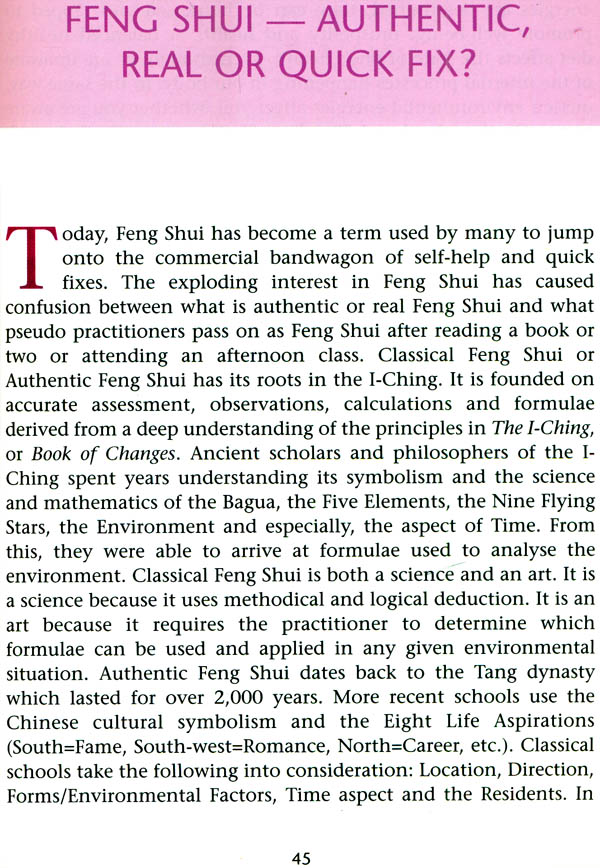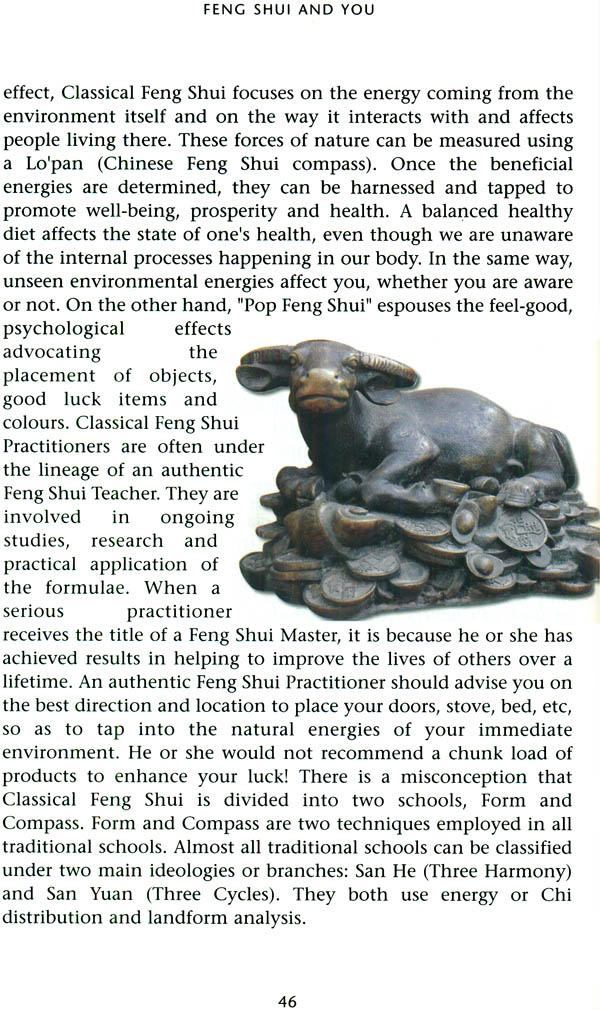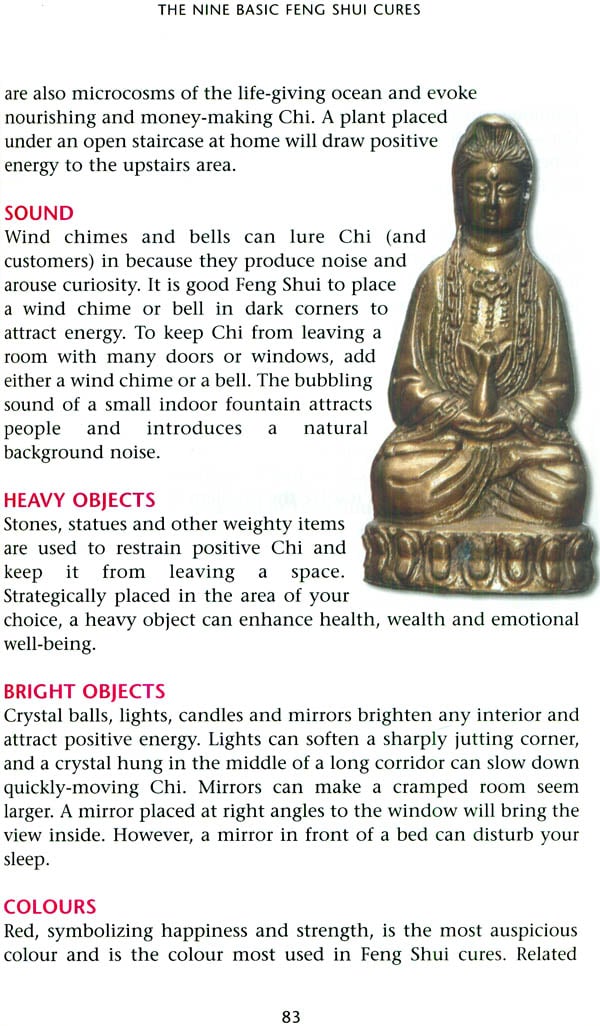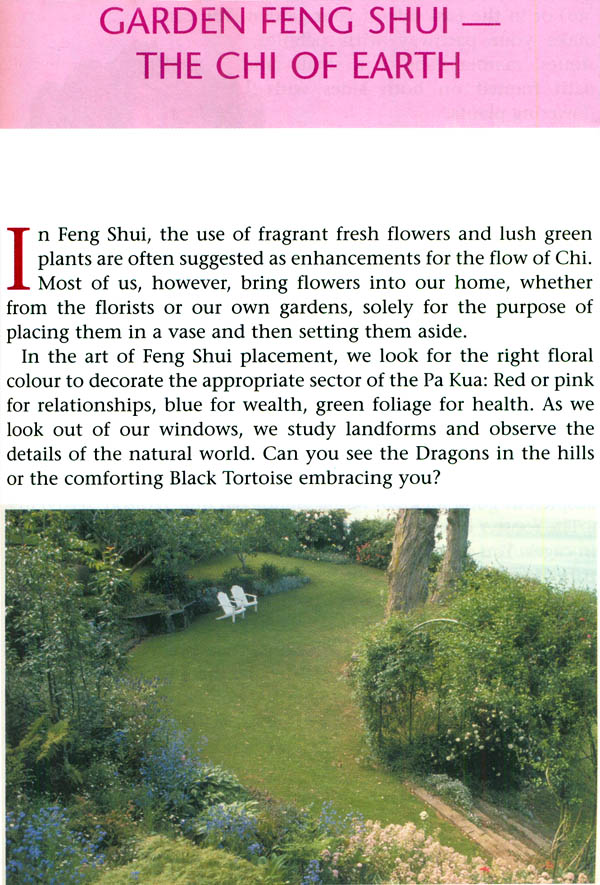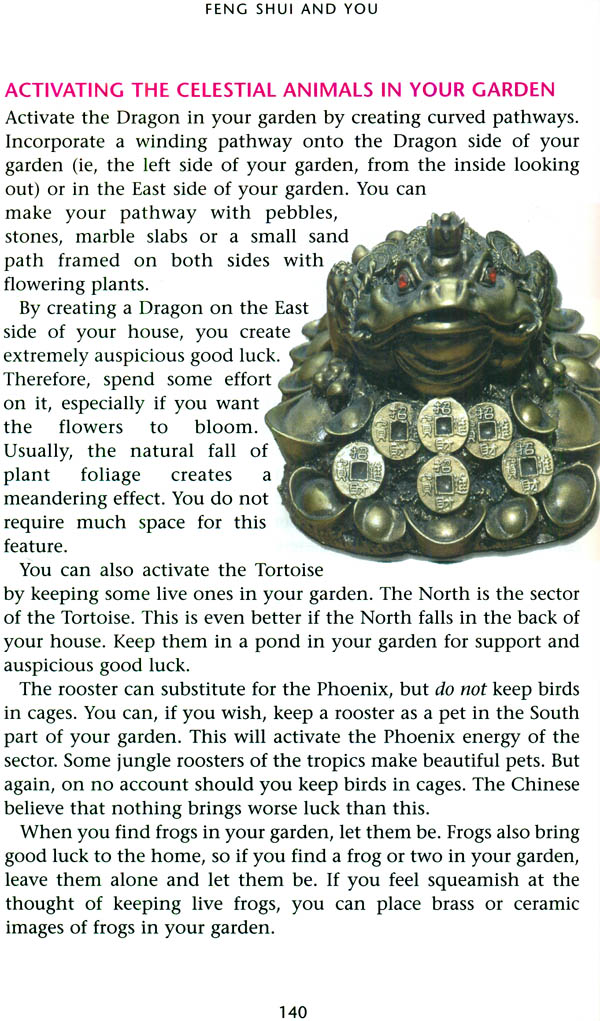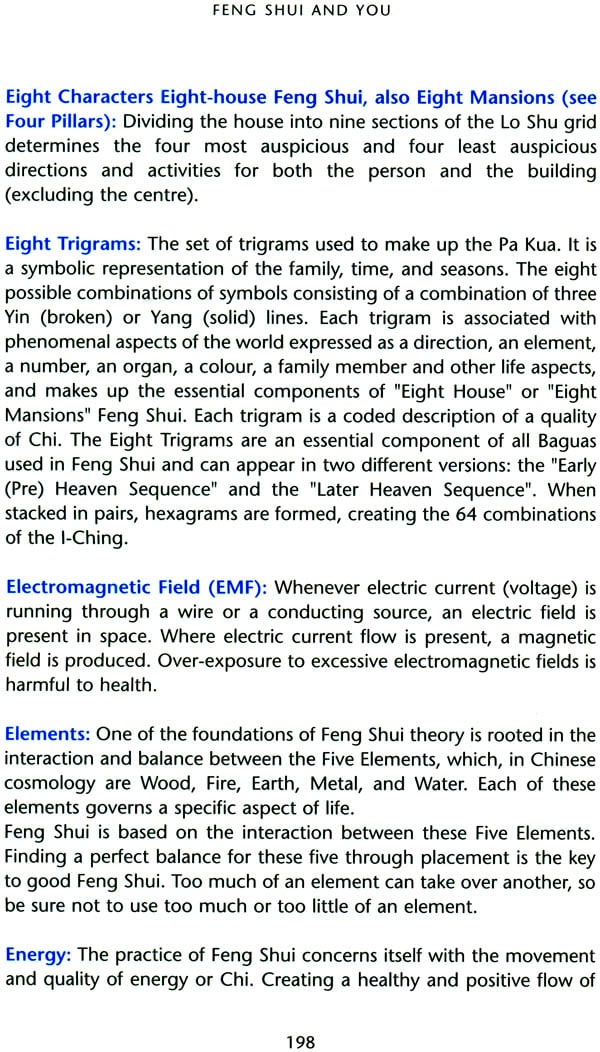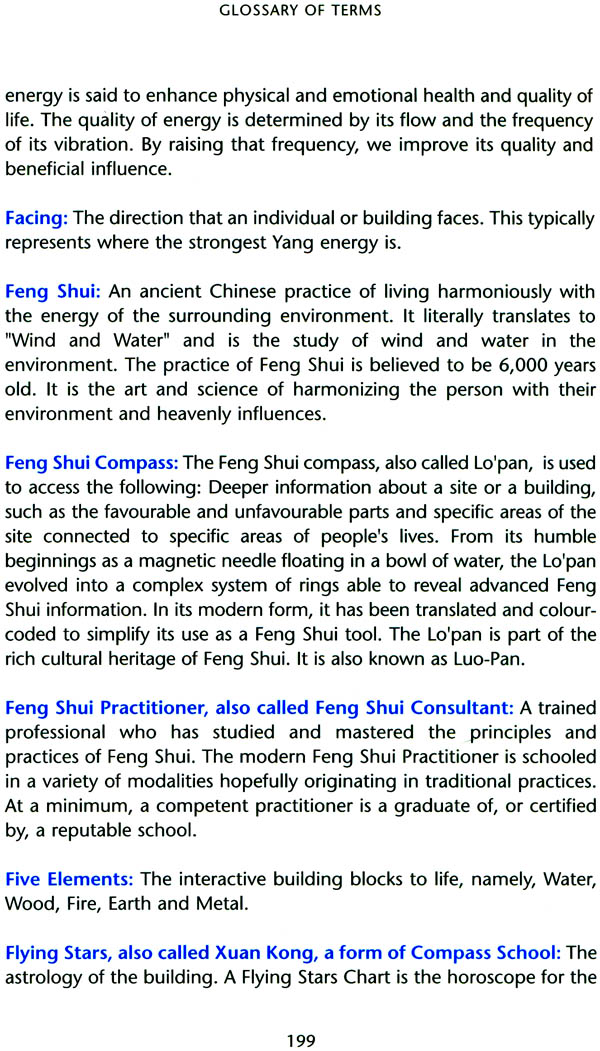
Feng Shui and You
Book Specification
| Item Code: | NAH127 |
| Author: | Gita Kapoor |
| Publisher: | Times Group Books |
| Language: | English |
| Edition: | 2008 |
| ISBN: | 9788189906238 |
| Pages: | 208 (Throughout Color Illustrations) |
| Cover: | Paperback |
| Other Details | 8.5 inch x 5.5 inch |
| Weight | 340 gm |
Book Description
Gita Kapoor is a Feng Shui Master who has studied under world famous Feng Shui Grand Masters Lillian Too, Yap Cheng Hai and Joey Yap of Malaysia. A firm believer that education in any science is a continuous process, Gita is engaged in consulting her teachers to acquire further advanced knowledge in the fascinating science of metaphysics and geomancy known as Feng Shui.
Gita started studying Feng Shui from her Grand Masters from July 2000. Till date, she has to her credit certified courses on advanced Feng Shui mastery studies including Xuan Kong (Flying Stars, Chinese Astrology (Bazi, Traditional Yi Jing/I-Ching), including Plum Blossom Numerology, Mian Xiang (Face Reading) and so on.
With the Period of 8 having begun from February 4, 2004, Gita is presently engaged in providing consultancy in existing residential and commercial properties and in the design phase of new buildings and additions. She ensures the well-being of her clients by offering valuable advice on the suitability of purchasing a certain plot of real estate.
Her clients include architects, interior designers, fashion designers, film stars, medical practitioners, entertainers, CEOs, attorneys, restaurateurs, Union ministers, senior bureaucrats, and large industrial houses. They rely on her ability to use Feng Shui to synergize their positive energies and harmonize their lives.
Gita studied at Welham Girls High School, Dehradun. Thereafter, she obtained a Diploma in Business and Office Management. Her work experience spans a large number of corporate companies in India, as well as an Oberoi hotel in Baghdad, Iraq. For the past twenty years, she is employed with The World Bank's office in New Delhi.
Gita Kapoor writes a weekly column on Feng Shui for the Sunday edition of Delhi Times and contributes to some other popular magazines. She is widely written about and has appeared on some television shows as well.
WHAT IS FENG SHUI?
Feng Shui means "Wind and Water" and has been used for thousands of years in China and the Far East as a method for determining the most appropriate locations for a harmonious life. These locations can be the site of a building, the floor plan of a house or just the layout of a room.
WHAT CAN FENG SHUI DO FOR ME?
Feng Shui affects every aspect of our lives and the way it is applied can be both beneficial and detrimental to the way we live and the surrounding environment. Feng Shui is not a religion, although some of its advocates may consider it a part of their religious practice. It is not necessary to follow any religion to understand or practice Feng Shui. Feng Shui is not just a philosophy as it also encompasses many practical tools and techniques. It is not a belief system. Asking someone if they believe Feng Shui is like asking them if they believe in the weather. It is not a question of faith, but a fact of life.
WHAT ARE THE VARIOUS SCHOOLS OF FENG SHUI?
Feng Shui has been around for thousands of years, and over many centuries different schools of Feng Shui have developed. Each school has a slightly different approach to the subject, although the basic principles are the same. The following sections outline the three main schools of Feng Shui:
Form School: This school focuses on landscape contours, along with the shapes of hills and watercourses. It is concerned with the auspicious positioning of buildings and burial sites, which requires that the hills provide protection from the wind (Feng) and there is provision for a good water (Shui) supply without flooding. It can also be considered the ancient Chinese version of surveying. The main concerns within the Form School are finding auspicious landforms called the Tiger and the Dragon. These are found by looking at the contours of the hills surrounding a site and determining whether their layout will bring good luck or bad luck.
Compass School: This style of Feng Shui uses the Eight Trigrams of the I-Ching and relates them to the eight points of the compass. These are laid out to form the eight-sided Pa Kua (often called the Bagua), which is used to interpret the auspicious and inauspicious locations for buildings, house floor plans and room layouts.
Black Hat Sect School: This is a modern version of Feng Shui developed in the USA as a hybrid of Tibetan Buddhism, Taoism and traditional Feng Shui. In this school, a Pa Kua is used, but it is based on the direction of the front door, rather than the compass directions. The house or room is divided into eight sectors, each having a bearing on an aspect of life that might need enhancement.
Whatever school one follows, the underlying principle of Feng Shui is to live in harmony with your environment so that the energy surrounding you works for you rather than against you. After all, why swim against the tide?
TIME & SPACE FENG SHUI OR XUAN KONG FLYING STARS
The most authentic Feng Shui is when a Flying Star analysis of the house or commercial property is done. What many are not aware of is that a premise also has a horoscope based on the year it was "born" (constructed). Based on the facing direction of the house, a Flying Stars Chart - which indicates the kind of energies that are flying in all nine palaces of the house namely N, S, E, W, NW, SW, SE, NE and the Centre - is prepared. It is the combination of these stars which creates the good or bad luck which affects the residents. There are, in all, 81 Flying Star combinations, and one of the amazing aspects of the Flying Star technique is its ability to forecast outcomes based on the interaction or combination of stars.
Flying Star Feng Shui is the system of Chinese Classical Feng Shui that studies how our environment and fortune are affected by various energies, which are changing over Time and Space. In this system, we focus our attention on nine different kinds of energies, identified by the numbers 1 to 9. We also understand that each kind of energy has special properties, some of which will bring prosperity and some that will bring misfortune. These energies are dynamic and moving constantly over time in a fixed pattern. As Such, their position and impact at a certain moment of time is predictable. For example, the worst energy is Number 5, which means misfortune and is present in the South location in the current Year of the Rat, ie, 2008. The South location refers to the South of a house, apartment, building, city or country.
Using the Flying Stars Chart, the prosperity and human fortune prospects of any residence or commercial building can be investigated and determined. The nine numbers represent nine tars and signify special combinations of energies that exist. In different periods of time, the star can be either harmful or fortunate. The important question is, when are the stars timely? for example, during Period 7, the Number 7 Red Star was the most timely star. However, in Period 8, the Number 7 Star is unfortunate while the Number 8 Star is the most fortunate star. The combinations of these numbers are studied in the context of good/poor human fortune and good/poor money luck.
There are also different levels of Flying Stars. Besides the year star which affects us for one whole year, like Number 8 in the East during the entire year of 2008, we also have month stars and day stars which will have an influence on our lives for a month or day, respectively. As such, at a certain day in a certain location, three stars are present. If they are all bad stars, then misfortune may happen in such a location on such a day.
How do we read such a chart? The emphasis is more on the pair of numbers on top of each square. They represent two types of energies in each location. The number on the right is called the Water Star and represents money and prosperity. The number on the left is called the Mountain Star and represents human harmony. In Flying Star Feng Shui, time is divided into 20-year cycles. Each cycle carries a number. The current 20-year cycle is called Period 8, so the Number 8 represents the most prosperous energy today. When Period 8 expires on February 3, 2024, the Period 9 energy will take over, and hence Number 9 is also important today as it represents future incoming energy. However, accurate Feng Shui evaluation requires accurate assessment and measurement on site. Without such an opportunity, most of the above analysis can only be based on assumptions that may be totally incorrect.
If we get our Feng Shui right, it can bring great fulfillment. It can help us to harmonize our lives, perform better, achieve more and be more creatively intuitive. When there is harmony in our home and workplace and correct focus in our life, good fortune, growth, longevity and prosperity will naturally follow.
| The Journey | 7 |
| Acknowledgements | 9 |
| Introduction to Feng Shui | 11 |
| A BRIEF HISTORY OF FENG SHUI | |
| Feng Shui - Mother of Natural Sciences | 17 |
| The Five Elements of Feng Shui | 19 |
| What is Feng Shui - The Chinese View of the Living Earth | 21 |
| Yin & Yang | 23 |
| East vs. West | 27 |
| A Harmonious Environment | 29 |
| Feng Shui & Chi Flow | 31 |
| Feng Shui - What it is & What it is Not | 35 |
| Heaven, Human & Earth Luck | 37 |
| Feng Phooey - Dispelling Some Myths | 39 |
| Feng Shui - Magic or Science | 41 |
| The Golden Rule of Feng Shui | 43 |
| Feng Shui - Authentic, Real or Quick Fix? | 45 |
| What is a Feng Shui Audit of a Home? | 47 |
| Period 8 Feng Shui - A New Era from 2004-24 | 49 |
| How to Select Good Feng Shui Locations | 51 |
| Feng Shui Tips for Buying Property | 57 |
| The Importance of Using a Good Compass | 59 |
| The Ten Most Important Feng Shui Design Tips | 63 |
| Finding the Right Feng Shui Consultant | 65 |
| Red Envelopes & the Feng Shui Tradition | 71 |
| FENG SHUI FOR THE COMMON MAN | |
| Use Feng Shui to Increase your Wealth - Your Kua Number & You | 75 |
| The Nine Basic Feng Shui Cures | 81 |
| Wind Chimes, Elemental Cures & The Salt Water Cure | 85 |
| Creating a Power Office with Feng Shui | 89 |
| Feng Shui for the Bedroom | 93 |
| Feng Shui for the Bathroom | 99 |
| Is your Toilet hurting your Health? | 103 |
| Feng Shui for the Kitchen | 107 |
| Feng Shui for Children's Rooms | 109 |
| Feng Shui for a Baby's Nursery | 113 |
| Feng Shui for Fertility | 115 |
| "Womb Shui" | 117 |
| FENG SHUI MISCELLANY | |
| Feng Shui Tips for Weight Loss | 121 |
| Aromatherapy & Feng Shui | 123 |
| Feng Shui & Religion | 125 |
| Feng Shui Advice for giving Gifts | 127 |
| Fashion Feng Shui | 129 |
| Colours in Feng Shui | 133 |
| Fish & Animals - Their Effect in Feng Shui | 135 |
| Garden Feng Shui - The Chi of Earth | 139 |
| Lucky Bamboo in Feng Shui | 141 |
| Candles & Feng Shui | 143 |
| Feng Shui your Home for Valentine's Day | 145 |
| Fifty-plus & still Single? Dating Tips for those Over Fifty | 147 |
| When to do a Feng Shui Space Clearing? | 149 |
| Clear that Clutter Right Out of your Life!. | 151 |
| How to Make your Home a Feng Shui Haven | 153 |
| Top Ten Ways to bring Bad Vibes into your Home | 155 |
| Spiral Staircases, Columns & Skylights | 159 |
| Things to Watch Out in Feng Shui | 161 |
| Avoiding Poison Arrows | 167 |
| Seven Feng Shui Tips for Well-being | 169 |
| THE CHINESE ZODIAC | |
| Bazi - The Four Pillars of Destiny | 175 |
| Animal Instincts - The Chinese Zodiac. | 177 |
| Colours of the Chinese Zodiac | 179 |
| The Year of the Brown Earth Rat, 2008 | 181 |
| GLOSSARY OF TERMS | 191 |
| ABOUT THE AUTHOR | 207 |
